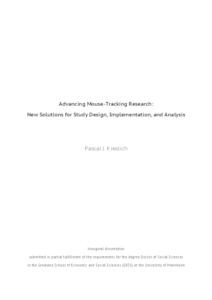|
Advancing mouse-tracking research : new solutions for study design, implementation and analysis
Kieslich, Pascal J.
![[img]](https://madoc.bib.uni-mannheim.de/47143/1.hassmallThumbnailVersion/Kieslich_Dissertation.pdf)  Vorschau |
|
PDF
Kieslich_Dissertation.pdf
- Veröffentlichte Version
Download (11MB)
|
|
URL:
|
https://madoc.bib.uni-mannheim.de/47143
|
|
URN:
|
urn:nbn:de:bsz:180-madoc-471437
|
|
Dokumenttyp:
|
Dissertation
|
|
Erscheinungsjahr:
|
2018
|
|
Ort der Veröffentlichung:
|
Mannheim
|
|
Hochschule:
|
Universität Mannheim
|
|
Gutachter:
|
Hilbig, Benjamin E.
|
|
Datum der mündl. Prüfung:
|
7 Dezember 2018
|
|
Sprache der Veröffentlichung:
|
Englisch
|
|
Einrichtung:
|
Fakultät für Sozialwissenschaften > Allgemeine Psychologie (Bröder 2010-)
Außerfakultäre Einrichtungen > GESS - CDSS (SOWI)
|
|
Fachgebiet:
|
150 Psychologie
|
|
Normierte Schlagwörter (SWD):
|
Experimentelle Psychologie , Kognitiver Prozess , Software
|
|
Freie Schlagwörter (Englisch):
|
mouse-tracking , software , process tracing , experimental design , decision-making
|
|
Abstract:
|
This thesis addresses the topic of mouse-tracking, that is, the recording and analysis of mouse movements in computerized experiments. Mouse-tracking is an increasingly popular process tracing method in many psychological disciplines as it allows capturing the temporal development of the relative attraction to and conflict between response alternatives. It thus provides the opportunity to test psychological theories about factors that influence the conflict involved in making a decision, and how this conflict develops over time. So far, researchers have faced a number of difficulties when conducting mouse-tracking studies: There has been no easy-to-use, flexible and open software for creating experiments and no general-purpose package for analysis. Researchers also have had to make many choices regarding the study setup, with no evidence-based guidelines to support their decisions. This thesis aims to provide solutions for these challenges.
First, this thesis introduces free and open-source software packages for creating and analyzing mouse-tracking experiments. The mousetrap plugin enables researchers to implement mouse-tracking in their experiments without programming and, through integration with the experiment builder OpenSesame, offers a graphical user interface that makes it easy to create a variety of experiments and designs. The mousetrap R package provides extensive functionality for processing, analyzing, and visualizing mouse-tracking raw data of all major formats. It implements most of the commonly used preprocessing procedures and mouse-tracking indices, as well as a set of novel visualization and classification procedures for analyzing trajectory shapes.
Second, this thesis presents results from a series of experiments that investigate how the methodological setup influences mouse-tracking data. In separate experiments, I manipulated the design factors starting procedure, mouse sensitivity, and response indication and investigated their impact on trajectory curvature and shape. An additional study investigated the effects of the starting procedure on movement consistency and also included dynamic analyses. While central cognitive effects on trajectory curvature were replicated in all setups, their size varied considerably between some of the setups. In addition, the setup strongly influenced the trajectory shapes and dynamic analyses. Based on this evidence, I discuss implications for interpreting mouse-tracking data and offer preliminary recommendations for conducting mouse-tracking experiments.
In sum, I hope this thesis will contribute to advancing mouse-tracking research and making the method accessible to a broader audience.
|
 | Dieser Eintrag ist Teil der Universitätsbibliographie. |
 | Das Dokument wird vom Publikationsserver der Universitätsbibliothek Mannheim bereitgestellt. |
 Suche Autoren in Suche Autoren in
Sie haben einen Fehler gefunden? Teilen Sie uns Ihren Korrekturwunsch bitte hier mit: E-Mail
Actions (login required)
 |
Eintrag anzeigen |
|
|
 ORCID: 0000-0002-0853-9364
ORCID: 0000-0002-0853-9364



 Suche Autoren in
Suche Autoren in